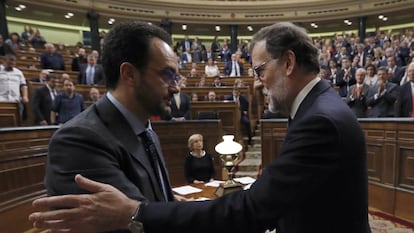Paradoxes
Spanish political parties must quickly transition from electoral logic to parliamentary logic

The Spanish two-party system had been an anomaly within the European party system; we recently left this behind only to embrace a new kind of anomaly: taking more than 300 days to form a government headed by a single party, without a stable majority to support it.
Although this type of government typically lasts less than majority administrations – whether single-party or in coalition – stability does not depend exclusively on the shape of the executive.
The Popular Party could end up dominating the executive for a long time to come
Between 1945 and 1998, Sweden and Italy had a similar number of minority, single-party governments. But the Swedish ones lasted on average twice as long as the Italian ones. What could bring us closer to Sweden and further away from Italy?
An essential requisite is for political parties to learn, following an election, to transition quickly from electoral logic to parliamentary logic. In a system with fragmented power, the former is based on differentiation while the latter rests on agreements and concessions.
In Spain, the tone and content of the last investiture debate evidenced that parties are still focusing on differentiation, and clearly unable to assimilate the new scenario.
If they fail to react in time, parties could become trapped in a divisive logic that will act like a horse’s bridle: the more they pull on it, the harder it will be to get away from it and convince voters that conceding is not the same as giving in.
Permanent confrontation is a luxury that can only be afforded by those who are not interested in governing in the first place
Yet permanent confrontation inside a fragmented parliament is a luxury that can only be afforded by those who are not really interested in governing in the first place.
If the current distribution of power inside parliament remains the same, and parties continue to indulge in the logic of division, the Popular Party (PP) could end up dominating the executive for a long time to come.
This would lead to a great paradox: the people’s feeling of powerlessness that led to a crisis of representation, because changing governments did not mean changing policies, could result in an even deeper sense of helplessness when it becomes apparent that it is not even possible to bring about a change in the ruling party.
English version by Susana Urra.
Tu suscripción se está usando en otro dispositivo
¿Quieres añadir otro usuario a tu suscripción?
Si continúas leyendo en este dispositivo, no se podrá leer en el otro.
FlechaTu suscripción se está usando en otro dispositivo y solo puedes acceder a EL PAÍS desde un dispositivo a la vez.
Si quieres compartir tu cuenta, cambia tu suscripción a la modalidad Premium, así podrás añadir otro usuario. Cada uno accederá con su propia cuenta de email, lo que os permitirá personalizar vuestra experiencia en EL PAÍS.
¿Tienes una suscripción de empresa? Accede aquí para contratar más cuentas.
En el caso de no saber quién está usando tu cuenta, te recomendamos cambiar tu contraseña aquí.
Si decides continuar compartiendo tu cuenta, este mensaje se mostrará en tu dispositivo y en el de la otra persona que está usando tu cuenta de forma indefinida, afectando a tu experiencia de lectura. Puedes consultar aquí los términos y condiciones de la suscripción digital.









































